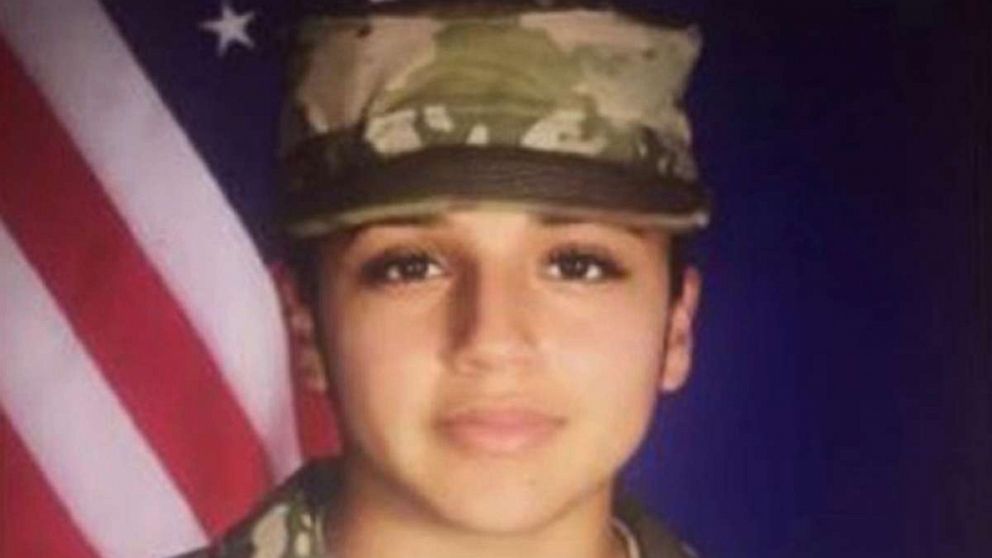Sexual harassment
As unanswered questions loom over missing Fort Hood soldier Vanessa Guillen, her family members spoke out about holding on to hope that the system that “failed her” can improve to help others.
“Since she was little, she wanted to join the Army to have better opportunities for herself and for my parents, to be someone in life, to be someone important,” Lupe Guillen, her sister, told ABC News on Wednesday, fighting back tears. “That’s why she wanted to join, to protect and serve. But yet they failed her.”
Vanessa Guillen, 20, was last seen in a parking lot on the Fort Hood base on April 22, according to the U.S. Army Criminal Investigation Command. Since her disappearance, her rank was upgraded to specialist from private first class.
Investigators found unidentified human remains on June 30 about 20 miles away from the base that are being analyzed. Natalie Khawam, an attorney for the Guillen family, believes them to be Vanessa’s, but the Army has not independently confirmed that.
A suspect investigators say they’ve connected to Vanessa Guillen’s disappearance died by suicide on Wednesday morning after being confronted by Killeen, Texas, police officers and federal marshals. That suspect was identified on Thursday as Aaron David Robinson, 20.
Robinson’s death by suicide, Khawam added, is “leaving us still with no information,” a big reason why Vanessa Guillen’s family is calling for a Congressional investigation.
A previously unidentified female suspect, described by authorities as “the estranged wife of a former Fort Hood soldier,” also has been taken into custody. She’s since been identified as 22-year-old Cecily Aguilar of Killeen.
Khawam told ABC News that CID officials told her Aguilar had made a confession, but there hadn’t been an arrest warrant issued for Robinson, “which is really disturbing.”
Aguilar, according to a statement issued by the U.S. Attorney’s Office, has been charged with with one count of conspiracy to tamper with evidence.
Robinson, according to the criminal complaint, told Aguilar “he killed a female soldier by striking her in the head with a hammer” April 22 at Fort Hood, and Aguilar helped him dispose of the victim’s body.
The Guillen family and Khawam said at a press conference on Wednesday that Robinson was Vanessa Guillen’s superior, and accused him of sexually harassing her.
But at a news conference at Fort Hood on Thursday, Damon Phelps, the Army’s lead investigator in the case, described Robinson as a coworker who was not in her chain of command. Phelps disputed the family’s claim that Guillen had been harassed by Robinson.
“There is no credible information that Specialist Robinson sexually harassed Specialist Guillen,” Phelps said.
Lupe and Mayra Guillen said their sister’s fear of reporting a sex-related crime in the military isn’t uncommon.
“She was afraid to report it. She reported it to her friends. She reported it to her family. She even reported to other soldiers on base, but she didn’t want to do a formal report because she was afraid of retaliation and being blackballed, and she, like most victims, just tried to deal with it herself,” Lupe Guillen told ABC News on Wednesday.
Lupe Guillen said she started the “Find Vanessa Guillen” Instagram account after her sister was reported missing. With over 100,000 followers, the hashtag #findvanessaguillen became an outlet for others.
Hundreds of military members have reacted to the account, airing their own grievances in the comment section or in private messages. Like Vanessa Guillen, many said they were afraid to speak up.
The Pentagon’s latest report on sex-related crimes in the military showed a 3% increase in the number of sexual assaults reported in the 2019 fiscal year — 6,236 compared with 6,053 a year earlier.
The report said the military received 1,021 formal sexual harassment complaints, a 10% increase from 2018.
ABC News reported in May that the number of sexual assaults at the three military service academies spiked by 32% over the last year, with 149 reports of sexual assault involving a cadet or midshipman as a victim and/or subject during the 2018-2019 academic year.
In the wake of Vanessa Guillen’s disappearance and claims by her family, the Army launched an investigation into a program at Fort Hood that’s intended to support sexual harassment or sexual assault victims.
The Army has sent a seven-member inspection team to the base at the request of the base’s senior leadership for a week-long investigation into how the program operates, assessing whether the command climate is supportive of soldiers who step forward.
Data from the 2018 RAND study that looked at sexual prevalence in the military found that in fiscal year 2014 Fort Hood had the highest number of reported sexual assaults and rapes of any U.S. military facility worldwide.
The 885 reported sexual assaults from October 2014 through September 2015 made the sprawling base the 10th riskiest Army facility for female soldiers that year and the eighth riskiest for male soldiers.
Fort Hood also has been rocked by a number of scandals, including a prostitution ring discovered in 2014.
At this time, the Guillen family and Khawam said they want justice not just for Vanessa but for all members of the military.
The family wants to host a large protest outside military bases, including Fort Hood, pass a bill called “I am Vanessa Guillen” to help protect both men and women from sexual harassment, and urge people not to enlist in the military until justice is served.
“Knowing that this could happen to anyone, knowing that there’s more victims out there, would you let your child, your son or daughter, sign a contract with the Army knowing that their life is at risk?” said Lupe Guillen, tears streaming down her cheeks. “My sister deserves to be protected. Your child deserves to be protected. Don’t let them recruit you until we get justice — until Vanessa gets justice.”
